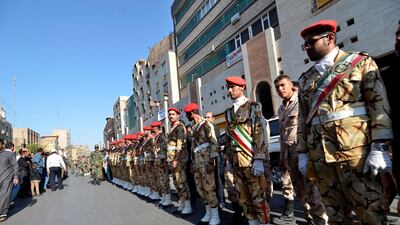An ISIS mastermind, named as Abu Zahi and linked to a deadly attack last month in southern Iran, was killed along with "four other terrorists" in Iraq on Tuesday, the elite Revolutionary Guards said in a statement.
The five were killed "during a reconnaissance and surprise operation by forces of the resistance this morning in Iraq's Diyalah province," northeast of Baghdad, the statement said.
The "resistance" is a term used for militias operating in Iraq and Syria with Tehran's support, and trained by the Revolutionary Guards.
Abu Zahi was "the mastermind of the recent terrorist crime in Ahvaz," the statement added.
But last month an Iranian military spokesman had rejected the notion that ISIS was behind the attack and said the gunmen were trained by two Gulf Arab states and had ties to the United States and Israel.
__________
Read more:
Iran attack: a tangled web of claims and blame
IRGC threatens US and Israel with revenge after parade attack
_________
"They are not from Daesh [ISIS] or other groups fighting [Iran's] Islamic system," Brig Gen Abolfazl Shekarchi told the official news agency IRNA. "But they are linked to America and Mossad," Israel's intelligence agency.
The attack on a military parade in the mainly ethnic Arab city of Ahvaz in southwestern Iran left 24 people dead last month.
Almost half of the victims were reportedly members of the Islamic Revolutionary Guards Corp, making it one of the worst attacks ever on the elite force.
Ahvaz is home to a decades-old separatist movement. Some Arabs, one of two main ethnic groups in the province alongside Persians, complain of systematic discrimination and demand Independence from what they describe as a “Persian occupation.” The oil-rich province is one of the country's least developed.
Claims of responsibility for that attack were posted by both ISIS and by a separatist group calling itself Ahvaz National Resistance.
President Hassan Rouhani warned of a "crushing response".
On October 1, Iran said it had struck extremists in Syria with ballistic missiles and combat drones in retaliation for the September attack.

